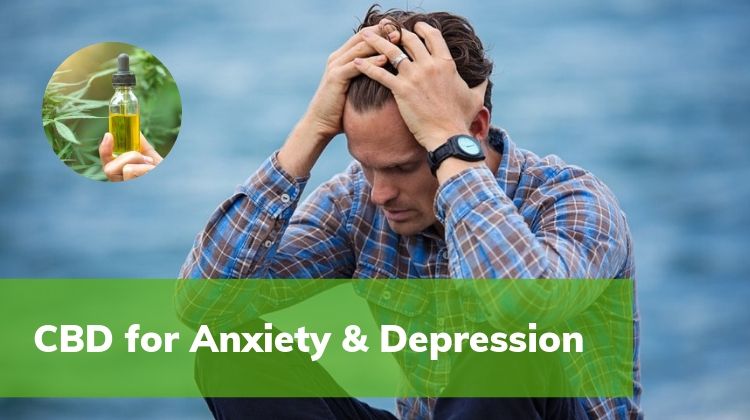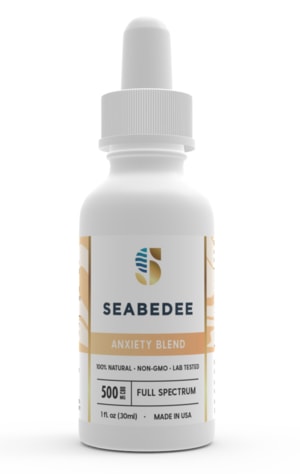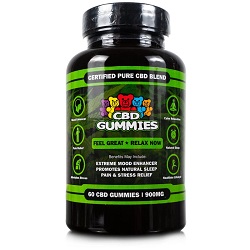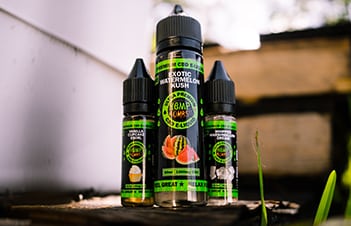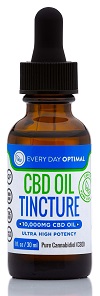The use of CBD oil as a treatment for anxiety and depression has been making national headlines. However, the FDA has yet to approve any CBD related drugs for either of these conditions.
This leaves many folks rightly wondering if there is anything to CBD oil or if this is just another internet fad being promoted by people profiting off the sale of CBD products.
The fact is that there is a surprising amount of research that supports the potential therapeutic effect of CBD on anxiety and depression. But how do you know that you have the best cbd oil for anxiety? That's where we can help.
Top CBD Oils for Anxiety and Depression
Product | Details | Price |
|---|---|---|
Our #1 Rated Seabedee Anxiety Blend | This is my favorite CBD oil for both Anxiety & Depression because it has been combined with a blend of natural plant based terpenes. This blend specifically promotes relaxation and has mood enhancing properties. This is the product for you if you want relieve anxiety or lift your mood. | Use Coupon oilgeek10 |
Best Edibles Hemp Bombs Gummies | If you like your CBD in the form of a tasty treat then try these Gummies. They are one of the stronger edibles on the market and taste great. | Use coupon Geek15 at checkout for 15% off |
Best Vape Oil Hemp Bombs | So you prefer to vape your cbd oil? Hemp Bombs make a great range of CBD E-liquid with some of the strongest and highest quality options on the market. | Use coupon Geek15 at checkout for 15% off |
Extreme Stength EveryDay Optimal 10,000mg | This is literally the strongest CBD product on the market right now - containing a whopping 10,000mg of CBD. Only experienced users should try this and only if you cannot get relief from a weaker tincture. | Use coupon cbdoilgeek10 at checkout for 10% off |
If you have been following the recent trends in healthcare, you may have noticed that many states are rapidly beginning to legalize medical marijuana across the United States.
There are now 30 states that have decided that the medical research has proven that the healing benefits of this plant are important enough to overturn decades of preconceived negative connotations and the criminalization of this drug.
Its scientific name, cannabis sativa also know medical marijuana. There are several compounds in the plant, called cannabinoids, thought to have a wide variety of powerful healing properties, some of which have been refined into pharmaceutical drugs.
One of the most famous of the cannabinoids is THC, or Tetrahydrocannabinol, which is the primary psychoactive compound in the plant. Although it does have known healing properties of its own, it is also the main component responsible for the “high” associated with cannabis.
The second very common cannabinoid found in cannabis is CBD or cannabidiol. This compound is also associated with many health benefits, and it DOES NOT cause any “high” or impaired judgment. In addition, it is less expensive than medical marijuana.
Plus, since CBD oil is extracted from industrial hemp (with a very low level of THC), it is legal in all 50 states and does not require a prescription.
Does CBD Oil Help With Anxiety?
According to the Anxiety and Depression Association of America, as many as 18% of Americas suffer from some form of anxiety disorder. Anxiety disorders are the most common mental health problem in the United States. Less than 40% of people that suffer anxiety disorders receive any treatment.
Even though cannabis has been used for centuries for its medicinal qualities, it is only in the last few decades that Western science has taken it seriously for its potential health benefits. One of the areas that shows a great deal of promise is the use of CBD to treat anxiety.
The main psychoactive cannabinoid found in cannabis sativa is THC, which is known to have an anxiety-producing effect in some parts of the brain, particularly when taken in high doses. It is thought that CBD, also found naturally in high quantities in this plant, may counteract this effect.
Numerous animal and human studies have demonstrated the anti-anxiety (also known as anxiolytic) properties of CBD. In addition, neuroimaging has confirmed the activity of CBD in the limbic and paralimbic regions of the brain related to the expression of anxiety. Choosing the best cbd oils for anxiety is important.
CBD has been studied relative to some specific disorders related to anxiety, including:
CBD and Social Anxiety Disorder (SAD)
Social anxiety disorder is a specific form of anxiety that is triggered in situations where interaction with other people creates an unmanageable level of fear or anxiety. While some sufferers are able to manage this condition without pharmaceutical drugs and/or psychological treatment and live normal lives, the condition can become debilitating for others.
Social anxiety disorder can lead to social withdrawal, depression, and failed interpersonal relationships if left untreated.
While clinical research on CBD for social anxiety remains in the very early stages, some experiments on people with SAD show that CBD has some promise for a potential future treatment option for this disorder.
CBD for PTSD and Phobias
Anxiety disorders take on a variety of different forms. Phobias and PTSD are related in that they are both associated with elevated levels of anxiety in response to certain stimuli. Both conditions can have a significant negative impact on quality of life.
They are also both examples of “learned fear” responses where either an original trauma becomes associated with certain triggers or the repeated fear response to a trigger becomes an association on its own. In terms of the brain chemistry involved in programming these trigger/response cycles, the process is called “fear memory reconsolidation.”
It turns out that CBD not only reduces the fear response through its anti-anxiety properties, it may also be disrupting the fear memory reconsolidation process. While more research still needs to be done, some researchers see the future potential for CBD for PTSD and phobia treatment.
Panic Disorder
Although it remains to be studied in human clinical trials, a scientific review of the available research on CBD and its anti-anxiety properties in human and animal studies has led researchers to claim that CBD is a promising drug for the treatment of Panic Disorder.
However, more studies need to be done to assess the precise efficacy, proper dosing, and potential side effects or counterindications with other medications in the treatment of this mental health disorder.
Substance Abuse
For similar reasons mentioned above, research shows some promise for the use of CBD for substance abuse treatment. The same activity that causes CBD to reduce the coupling between triggers and a fear response may be working to break the power of addiction by disrupting a similar drug memory process.
In addition, many people who are not able to find successful treatments to deal with their anxiety or depression can turn to mood altering drugs and alcohol as a solution. This kind of self-medication can lead to addiction.
CBD is certainly much safer than self-medicating with known addictive drugs such as opioids, amphetamines, and alcohol that people with extreme anxiety sometimes resort to to temporarily alleviate their symptoms.
Research on CBD for Depression
The available research on the use of CBD for depression is much less clear than the research on anxiety. There are a few reasons for this.
First, not as much research has been done on CBD in isolation from the other cannabinoids in medical marijuana, primarily THC. Since THC is well known to produce elevated mood states, studies that look at cannabis for the treatment of depression don’t tell us much about how isolated CBD affects depressive states.
Second, there is a wide degree of variance, at least in terms of the recreational use of marijuana, in terms of its effect on depression.
Some people report that using marijuana actually makes them MORE depressed (although separating illicit drug use patterns and problematic social contexts such as poverty, abuse, and crime is a very difficult proposition), a dangerous situation for a population at risk for suicide. Other studies show an overall drop in suicide rates in states after the legalization of medical marijuana.
Third, the vast majority of research on isolated CBD and depression have been done on laboratory animals, which may or may not extend to humans. We won’t have good answers for this without more research.
Endocannabinoid System and Happiness
One interesting study suggests that the body’s natural endocannabinoid system (ECS) is related to happiness, both as a temporary state and in terms of the ability to experience pleasure and a more positive overall emotional state. It seems that certain genetic predispositions of the ECS may be one factor that determines how happy we are in life!
CBD and 5-HT1A Receptors
If you familiarize yourself with the research on CBD oil for depression, you will quickly notice the 5-HT1A receptor getting thrown around quite a bit. Although you may not be aware of this term, you have probably heard of what this receptor binds to, the neurotransmitter serotonin.
In addition to being known as the “happy” hormone, serotonin has important roles to play in digestion, mood, appetite, and sleep. This hormone is the most common target of pharmaceutical drugs developed to treat depression.
Many of the most common prescription anti-depressant medications, the Selective Serotonin Reuptake Inhibitors (SSRI) class, work by increasing the concentration of serotonin by blocking the reabsorption of serotonin thereby increasing the total concentration of this important chemical throughout the body.
5-HT1A receptors play a vital role in regulating the amount of serotonin as well. They work by communicating when they are hit with a serotonin molecule, signaling to the brain to reduce the production of this critical hormone.
With many prescription anti-depressants, the 5-HT1A receptors have to become desensitized to increased serotonin levels before they stop working against the anti-depressant’s action. This is why many of these medications can take 3-4 weeks to be effective.
Some pharmaceuticals, such as Buspirone, are agonists of the 5-HT1A receptors. Although this class of drugs is typically prescribed as an anti-anxiety medication, they are also sometimes prescribed as an augmentation of SSRI drug therapy for clinical depression.
It turns out that CBD is likely also an agonist of the 5-HT1A receptor, which means that it may have some properties that can help with depression for some people. Preliminary research has confirmed this finding, although more research on human subjects remains to be done.
Mental Health and Psychiatric Care for Anxiety and Depression
Before moving on, I think it is really important to remind readers that there is no substitute for the medical advice of a trained psychiatrist or psychologist when it comes to getting help for mental illness. Self-diagnosing and self-medicating is dangerous business.
While I do think that knowing what research is out there regarding CBD and mental health can make people bring a more informed perspective to the table when engaging the healthcare community, it is not equivalent to the years of specialized training that physicians and mental health professionals undergo in order to do their best to guide us to better health.
If you or someone you love is struggling with anxiety or depression, please be sure to seek professional medical advice before adding CBD or other supplements to your lifestyle.
How to Use CBD oil for Anxiety
CBD oil comes in several different forms, giving you options for how to take it as a supplement. If you are new to using CBD, you should expect to do a little experimenting to find out the method of taking CBD for depression or anxiety that works best for you.
The three most common ways to take CBD oil are CBD oil tinctures, CBD capsules and CBD vape products. Although there are other ways to take it such as suppositories, edibles, and dabbing, this review will look at the three most popular methods.
At the end of the information section, I will provide my recommendation for the best of each of these forms of taking CBD, along with helpful information on each to help you decide which is best for you.
How much CBD oil to take for Depression or Anxiety?
Since I am not a doctor, I would not dream of offering specific dosing advice. You really should discuss using the best CBD oil for depression with your doctor, especially if you are already taking other medications. CBD sometimes enhances the effect of other drugs, and in some cases could interfere with their mechanisms.
That being said, cannabidiol is known to be very safe, even in high doses. And, it can have different effects on different people, which means it can be trial and error to find the right dose and method of taking it that work best for you.
Start low and increase slowly. When you buy CBD oil, the manufacturer will usually offer a suggested dosing range that is based on the actual concentration of CBD in their product. That is a good starting point. Try the lower end of the range first, increasing the dose slowly over the course of a few days until you get the desired effect.
In addition, you should be aware that CBD sometimes takes a few days to a week to start being effective, especially for people that have no experience with CBD or other cannabis products.
Conclusion
I hope this article has served as a resource for those that want to learn more about how CBD oil may help with depression and anxiety. Although the research is still in the early stages, this natural health supplement is both safe and is side effect free for most people.
Before you buy, make sure that you know you are getting a quality product by going with a well-researched company such as the two I have recommended here.
If you do decide to make a purchase today, please check back to let folks know about your experience. You just might help someone else find the right CBD oil products for depression and anxiety.
